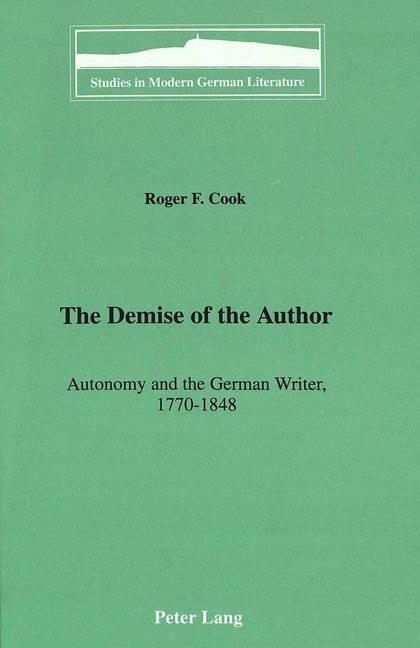
Door een staking bij bpost kan je online bestelling op dit moment iets langer onderweg zijn dan voorzien. Dringend iets nodig? Onze winkels ontvangen jou met open armen!
- Afhalen na 1 uur in een winkel met voorraad
- Gratis thuislevering in België vanaf € 30
- Ruim aanbod met 7 miljoen producten
Door een staking bij bpost kan je online bestelling op dit moment iets langer onderweg zijn dan voorzien. Dringend iets nodig? Onze winkels ontvangen jou met open armen!
- Afhalen na 1 uur in een winkel met voorraad
- Gratis thuislevering in België vanaf € 30
- Ruim aanbod met 7 miljoen producten
Zoeken
€ 55,95
+ 111 punten
Omschrijving
This book examines how the concept of the autonomous writer evolved in German culture. Its scope includes various forms of representation that both engendered the notion of the autonomous writer and became vehicles for casting the writer's tenuous position in society. Taking the «writer» as a function not only of a literary discourse, but also of a network of interlocking discourses, it explores the genesis of the autonomy concept in relation to the changing make-up of the reading public, new practices in reading, and the intermediary role of the literary market between author and public. Combining the results of sociological studies with critical readings of theoretical and literary texts, this work contributes to the ongoing reassessment of how the aesthetic and the real act dialectically in the determination of social reality. It also adds to the growing critical assault on the persistent tendency to privilege aesthetic autonomy over the interaction of art and history.
Specificaties
Betrokkenen
- Auteur(s):
- Uitgeverij:
Inhoud
- Aantal bladzijden:
- 229
- Taal:
- Engels
- Reeks:
- Reeksnummer:
- nr. 52
Eigenschappen
- Productcode (EAN):
- 9780820420127
- Verschijningsdatum:
- 1/05/1993
- Uitvoering:
- Hardcover
- Formaat:
- Genaaid
- Afmetingen:
- 236 mm x 161 mm
- Gewicht:
- 479 g

Alleen bij Standaard Boekhandel
+ 111 punten op je klantenkaart van Standaard Boekhandel
Beoordelingen
We publiceren alleen reviews die voldoen aan de voorwaarden voor reviews. Bekijk onze voorwaarden voor reviews.











